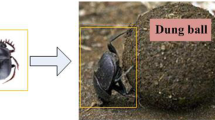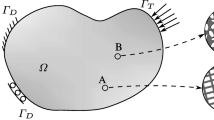Abstract
In this paper, a probabilistic modification of the minimal element algorithm for solving the axial three-index assignment problem is suggested. Its general idea is to extend the basic greedy-type algorithmic schemes using transition to a probabilistic setup based on variables randomization. The minimization of an objective function is replaced by the minimization of its expectation. The algorithm is implemented in three stages as follows. At the first stage, a motion in the set of random variables is defined. At the second stage, an inequality that expresses the local improvement condition is solved. At the third stage, the probabilities are recalculated, which represents an “adaptation” process. The second stage reveals a feature of the algorithm: the resulting solution depends on the “qualities” of the element itself and also on possible losses of its choice.
Similar content being viewed by others
References
Karp, R.M., Reducibility among Combinatorial Problems, in Complexity of Computer Computations, New York: Plenum, 1972, pp. 85–103.
Hansen, P. and Kaufman, L., A Primal–Dual Algorithm for the Three–dimensional Assignment Problem, Cahiers du GERO, 1973, vol. 15, no. 3, pp. 327–336.
Pierskalla, W.P., The Tri–substitution Method for the Three–dimensional Assignment Problem, Canad. Oper. Res. Soc. J., 1967, vol. 5, pp. 71–81.
Aiex, R.M., Resende, M.G.C., Pardalos, P.M., and Toraldo, G., GRASP with Path Relinking for Threeindex Assignment, INFORMS J. Comput., 2005, vol. 17, pp. 224–247.
Huang, G. and Lim, A., A Hybrid Genetic Algorithm for the Three–index Assignment Problem, Eur. J. Oper. Res., 2006, vol. 172, pp. 249–257.
Euler, R., Odd Cycles and a Class of Facets of the Axial 3–index Assignment Polytope, Appl. Math. (Zastowania Matematyki), 1987, vol. 19, pp. 375–386.
Burkard, R.E., Rudolf, R., and Woeginger, G.J., Three–dimensional Axial Assignment Problems with Decomposable Cost Coefficients, Discret. Appl. Math., 1996, vol. 65, pp. 123–139.
Dell’Amico, M., Lodi, A., and Martello, S., Efficient Algorithms and Codes for the k–cardinality Assignment Problem, Discret. Appl. Math., 2001, vol. 110, pp. 25–40.
Afraimovich, L.G., A Lower Bound for the Three–Index Axial Assignment Problem with 1,2–Decomposition Cost Matrix, Vestn. Volzh. Gos. Akad. Vodn. Transp., 2016, no. 49, pp. 25–29.
Kravtsov, V.M. and Kravtsov, M.K., Characterization of the Types of Maximum Noninteger Vertices in the Relaxation Polyhedron of the Four–index Axial Assignment Problem, Comput. Math. Math. Phys., 2013, vol. 53, no. 5, pp. 655–665.
Kravtsov, M.K. and Kravtsov, V.M., Types of Maximum Noninteger Vertices of the Relaxation Polyhedron of the Four–Index Axial Assignment Problem, Russ. Math., 2012, vol. 56, no. 3, pp. 6–13.
Tsidulko, O.Yu., On Solvability of the Axial 8–index Assignment Problem on Single–Cycle Permutations, J. Appl. Ind. Math., 2014, vol. 8, no. 1, pp. 115–126.
L’vovich, Ya.E., Kaplinskii, A.I., Chernyshova, G.D., and Chernykh, O.I., Design of Adaptive Exhaustive Search Schemes for Solving Diskrete Optimization Problems, Aktual’n. Probl. Fundamental’n. Nauk, 1991, pp. 44–46.
Medvedev, S.N., Adaptive Algoritms for Solving the Three–index Assignment Problems, Tr. VI Mezhd. konf. “Sovremennye metody prikladnoi matematiki, teorii upravleniya i komp’yuternykh tekhnologii” (Proc. VI Int. Conf. “Modern Methods of Applied Mathematics, Control Theory and Computer Technologies”), Voronezh, Sept. 10–16, 2013, pp. 153–156.
Medvedev, S.N. and Chernyshova, G.D., Using Adaptive Algorithms for Solving the Three–Index Assignment Problem, Vestn. Fak. Prikl. Mat. Inform. Mekh., 2010, vol. 8, pp. 148–155.
Medvedeva, O.A. and Medvedev, S.N., The Staff Recruitment Problem, Tr. Mezhd. konf. “Aktual’nye problemy prikladnoi matematiki, informatiki i mekhaniki” (Proc. Int. Conf. “Topical Problems of Applied Mathematics, Computer Science and Mechanics”), Voronezh, Nov. 26–28, 2012, part 2, pp. 203–208.
Gol’shtein, E.G. and Yudin, D.B., Zadachi lineinogo programmirovaniya transportnogo tipa (Linear Programming Problems of Transport Type), Moscow: Nauka, 1969.
Author information
Authors and Affiliations
Corresponding authors
Additional information
Russian Text © S.N. Medvedev, O.A. Medvedeva, 2019, published in Avtomatika i Telemekhanika, 2019, No. 4, pp. 156–172.
Rights and permissions
About this article
Cite this article
Medvedev, S.N., Medvedeva, O.A. An Adaptive Algorithm for Solving the Axial Three-Index Assignment Problem. Autom Remote Control 80, 718–732 (2019). https://doi.org/10.1134/S000511791904009X
Received:
Revised:
Accepted:
Published:
Issue Date:
DOI: https://doi.org/10.1134/S000511791904009X




